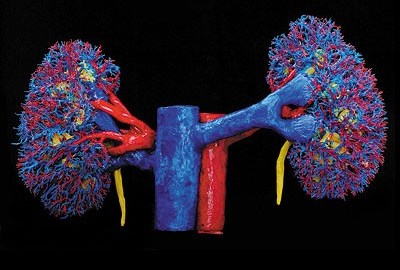Is My Redundant Kidney a Natural Resource?

As I’ve told you before, we’re having this big conference at Berry College funded by the Science of Virtues Project at the University of Chicago on November 17-18.
We’re going to cover four of the big ethical issues facing us in our high-tech and biotechnological time: HIGHER EDUCATION, THE PRACTICE OF PSYCHIATRY, HEALTH CARE, and ORGAN MARKETS.
I think I may have had one post too many on higher education.
But it’s hard not to be fascinated with and bit creeped out by the organ market issue.
Our speaker is going to be Dr. Benjamin Hippen, a nephrologist and a philosopher. He’s had lots of firsthand experience with people stuck on dialysis. That’s why he’s for regulated organ markets—for developing a fairly safe way of buying kidneys for the something like 100,000 Americans on dialysis who need them.
When Congress passed the entitlement legislation covering the cost of dialysis, the argument was that this medical care would get people back to work. But that’s hardly ever true. Dialysis is kind of a full-time job for those who must have it to stay alive. One day is spent having dialysis, the next getting over it.
Next to the brain, the kidney is my most complicated organ. It works wonderfully well in cleansing my blood of waste. Dialysis doesn’t work nearly as well. So, even in the best case, it’s a kind of very slow poisoning. Although the occasional person lives for a long time on dialysis, it’s usually a slow killer over a fairly small number of years. People usually get sicker and sicker.
There is surely a very admirable kind of virtue in living well on dialysis, on not giving up, on making the most of the life you have. But we can’t expect our poets to celebrate that virtue. And the people actually on dialysis we can’t expect to be poets themselves. They are surely among the most marginalized of Americans.
I’ve talked to people cruel and judgmental enough to blame the people on dialysis for their tough situation. The most common cause of kidney failure is type-2 diabetes, the kind you typically get through getting fat by eating way too many carbs.
But, for one thing, we have to remember that the Americans with the worst diets are often stuck in positions without the time to reflect on what they’re eating or the money to eat much better. Scientific eating and exercising tends to be the privilege of fairly rich folks with fairly easy jobs (and often no or hardly any kids). We also have to remember that African Americans suffer disproportionally from kidney failure, even when we control for diet and class and such.
We should certainly push preventative medicine and all that, but it’s not clear that the big effort would reduce the number of people with failed kidneys all that much. There’s still type-1 diabetes, which is found anmong kids and leads much more certainly to eventual kidney failure. And kidney failure plagues the elderly even without diabetes or who aren’t overweight. Living longer is going to put more Americans in need of new kidneys.
So far, we’ve been relying on kidneys from the newly dead who checked out with their kidneys in good shape. A young person who died by head trauma is one especially good way to get such a kidney, and so a dumb joke is that one way to increase our cadaver kidney supply is to repeal those prohibitionist laws requiring motorcyclists to wear helmets.
Th number of “harvested” cadaver kidneys doesn’t come anywhere near meeting the need of people on dialysis. And there is really no way of pushing that number up all that much higher.
Not only that, cadaver kidneys just don’t last, even the best cases, nearly as long as a kidney transplanted from a live person. It appears the body treats the cadaver kidney as a diseased kidney, and it starts to die slowly almost immediately.
The time will come when there are really effective artificial kidneys. And maybe they will figure out of way of tweaking pig kidneys so they can be implanted in people without being rejected.
But for now, what people who need new kidneys really need is live kidneys transplanted from other people.
It’s true that each of us is free to give our second or redundant kidney as a gift. But those gifts, not surprisingly, are almost all to relatives or very close friends. Having only one kidney is a very minor risk factor, and the removal operation is close to as safe as an operation can be. Still, it’s unreasonable to expect people to become patients and be mutilated—even in a pretty insignificant way—for a stranger.
Some libertarians also worry about “the tyranny of the gift.” If I give you a kidney, to some extent I “own” you emotionally for the rest of your life. It’s reasonable to say that you can’t thank me enough.
With that thought in mind, we can say that what a person on dialysis really wants is a kidney purcheased from someone else at a fair price. Once I’ve paid you my money, I owe you nothing.
There’s a lot more, but this post is already too long.





